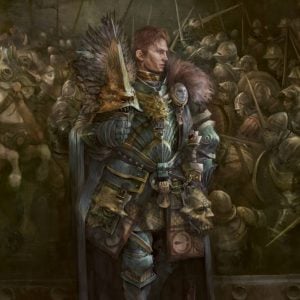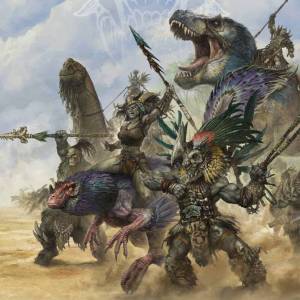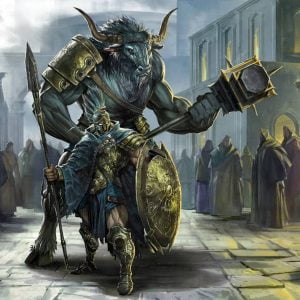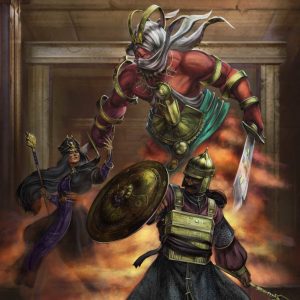“You are entirely wrong, Baron. He is no cub. He is a promising leader and a great warrior, an exemplary noble of the new generation, which is why he will be not allowed to gather allies. In this historic moment, he cannot be a shining example for the nobility.”
Bishop Madheus of Riismark
King Fredrik is regarded as one of the most controversial personalities in the Hundred Kingdoms. While this is mainly the result his latest actions, which shook the Conclave and challenged the status quo of centuries, his own history and that of his House only provided fertile ground for further debate and speculation.
His childhood home was not a happy one. With his great-grandfather on the throne when he was born, relationships between generations were distant and corrupted. His grandfather was an angry and belittled man with violent outbursts and Fredrik’s father all but ignored him. He insisted that his son be sent away from Brandengrad and indeed, despite his mother’s protests, Fredrik was sent to the University of Pravia soon after his sixth birthday, visiting his home only rarely since.
As a learning child, he displayed exceptional intelligence, which was often overshadowed by his bon vivant pursuits once he reached his teens. His father’s indifference soon turned to a dismissal of him and his “sinful ways”; his great grandfather, however, who still sat on the Throne, recognized both his potential and his need for discipline and Fredrik was sent to the Academia Proelia in Argem. While he also made a reputation for his lively times on leave, in the two years he spent there, his tutors and drillmasters discovered and cultivated his talent in combat, strategy and diplomacy. He never graduated; after all, few do. Instead, on his seventeenth birthday, he submitted himself to the sponsorship of Sir Ghart of Rottdorf for knighthood, reviving an old tradition that demanded a crown prince to serve as squire under a future vassal. He proved an excellent squire and earned his knighthood proper not long after.
His return to Brandengrad was far from cheerful. His mother had passed away, as had his grandfather, and yet still his great grandfather ruled. Fear loomed over the Household, the old-King’s exceptional life-span and health unnerving even the most loyal barons of Brandengrad’s Court. By leave of the King, Fredrik left almost immediately, to roam the Kingdom, learning his land and organizing drills for the military, while deteriorated alliances were shyly rekindled with gifts, talks and visits. Matters of the commoners, who the King had come to ignore for decades, were looked after, even if with some secrecy so as to avoid the Throne’s reaction. During this time, Fredrik showed he had a solid grasp of diplomacy and military affairs both, while his people came to know him as a charismatic and often considerate ruler, even if one with a temper at times.
A little over two years after his return, his centenarian great grandfather finally passed and decades of oppressed whispers rose immediately. Rumors about the Spire of Nepenthe and the old King became common in court. Talks of a sorcerer or witch or monster visiting the Throne room at nights, performing unnatural rituals to prolong his tired life. Some evem claimed that the young Prince had to end his rule, for he had often been heard saying that roaming the Kingdom had taught him much about his great-grandfather’s rule. Fredrik ignored the whispers but answered innuendos in his presence… harshly. His father, however, the newly crowned King Willem I, answered them by bringing a Bishop to Brandengrad, ordering the building of a new Cathedral for the Theist Church and proclaiming the Household’s piety. Be it for that or other reasons, the relationship with his son deteriorated further, with fights and shouts echoing often in Court. Despite their differences however, or perhaps because of them, the King publicly recognized Fredrik’s potential as a warrior and strategist, and never questioned or refused him his rights. He was appointed Margrave of Brandengrad, as tradition dictated for the Crown Prince, and was ordered to secure the borders. Taking his brother with him, Fredrik left the capital and his father’s side. He sent word to his contacts from the Academia in Argem and bolstered his army’s ranks with Imperial units, preparing for what he considered was inevitable. Indeed, about a year after that, Nepenthe attacked, leading Fredrik, his Kingdom and the entire world into a new era.
Τhe Battle of Nepenthe made Fredrik the first commander to have faced the Spires in battle since before the Fall. His trial for the murder of Bishop Madheus of Riismark raised the matter of the Spires’ activity in the Conclave. These earned Fredrik unlikely allies both within the Conclave and without, as well as the admiration of youthful nobility everywhere. At the same time, however, his deeds reignited old feuds between the nobility and the Theist Church, earning him the ire of the faithful, Sovereigns and commoners alike, and of those content with the status quo of centuries. He avoided an almost certain conviction for his crime solely because news arrived of his father’s death, his ascendancy to the throne of Brandengrad raising him above the jurisdiction of the Conclave. He left immediately for his Kingdom carrying a vague decree from the Conclave, dictating that restitution towards the Paeneticum were expected of him. When he returned to Brandengrad, he was welcomed by the ruins of Vatsdam, risen tensions between the Eleven Thrones of Riismark, sightings of a Dweghom army marching through his land and the ever present threat of Nepenthe within his own borders.
Fredrik is known to have ever been an advocate of absolute authority. He preaches with deed and word that a monarch’s rule must be supreme but to the benefit of the people. Now his convictions will be put to the test. His plan’s partial success in Vatsdam may have secured some time and many, old allies of the Throne and new alike, have offered support. But his own land’s resources are scarce and the outcome of a long-term war with Nepenthe uncertain. Some advocate a ceasefire, no matter the cost, others claim that expansion would secure the funds needed to fight this war, while others still plea for more allies to be called and favors to be asked. Surrounded by threats, political and religious enmities and a crisis unlike any in recent history, King Fredrik’s next choices may decide more than his own fate or that of his people.
[Start reading the Nepenthe series here!]












